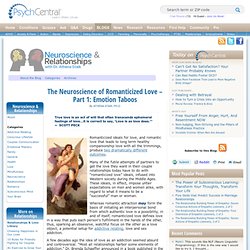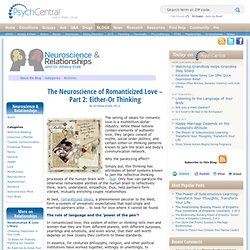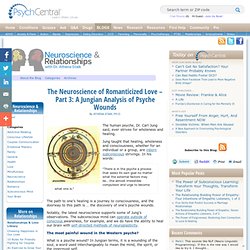

The Neuroscience of Romanticized Love – Part 1: Emotion Taboos. True love is an act of will that often transcends ephemeral feelings of love…it is correct to say, ‘Love is as love does.’” ~ SCOTT PECK Romanticized ideals for love, and romantic love that leads to long term healthy companionship love with all the trimmings, produce two dramatically different outcomes.

Many of the futile attempts of partners to get the love they want in their couple relationships today have to do with “romanticized love” ideals, infused into Western society during the Middle Ages. These ideals, in effect, impose unfair expectations on men and women alike, with regard to what it means to be a “successful” man or woman. A few decades ago the idea of love as an addiction seemed absurd and controversial. “Most all relationships harbor some elements of addiction,” Dr. What was once theory, however, is now proven science. Addictive relating stems from healthy inborn strivings to love and be loved, find value and meaning in life – and key relationships.
“Love is not a feeling. The Neuroscience of Romanticized Love – Part 2: Either-Or Thinking. The selling of ideals for romantic love is a multibillion-dollar industry.

While these notions contain elements of authentic love, they largely consist of myths, social order politics, and certain either-or thinking patterns known to jam the brain and body’s communication network. Why the paralyzing effect? Simply put, this thinking has attributes of belief systems known to jam the reflective thinking processes of the human brain with … fear. Only fear can paralyze the otherwise remarkable abilities of the human brain to reflectively think, learn, understand, empathize, thus, help partners form vibrant, mutually enriching couple relationships. At best, romanticized ideals, a phenomenon peculiar to the West, form a system of unrealistic expectations that lead single and married partners alike … to look for love where it cannot be found.
The role of language and the ‘power of the pen’? It’s limiting to define what emotional states men and women “should” express. Beliefs are life shaping. The Neuroscience of Romanticized Love – Part 3: A Jungian Analysis of Psyche Wounds. The human psyche, Dr.

Carl Jung said, ever strives for wholeness and healing. Jung taught that healing, wholeness and consciousness, whether for an individual or a group, are inborn subconscious strivings. In his words: “There is in the psyche a process that seeks its own goal no matter what the external factors may be….the almost irresistible compulsion and urge to become what one is.” The path to one’s healing is a journey to consciousness, and the doorway to this path is … the discovery of one’s psyche wounds. Notably, the latest neuroscience supports some of Jung’s observations. The most painful wound in the Western psyche? What is a psyche wound? A noted author, lecturer and interpreter of Jung’s work, Dr. In his analysis, he regards what he terms ‘romantic love’ as “the great wound in the Western psyche.” This concept, Dr. According to Dr. Psychology studies relevant to everyday life from PsyBlog.
The Top 10 Psychology Studies of 2010. The end of 2010 fast approaches, and I'm thrilled to have been asked by the editors of Psychology Today to write about the Top 10 psychology studies of the year. I've focused on studies that I personally feel stand out, not only as examples of great science, but even more importantly, as examples of how the science of psychology can improve our lives. Each study has a clear "take home" message, offering the reader an insight or a simple strategy they can use to reach their goals , strengthen their relationships, make better decisions, or become happier.
If you extract the wisdom from these ten studies and apply them in your own life, 2011 just might be a very good year. 1) How to Break Bad Habits If you are trying to stop smoking , swearing, or chewing your nails, you have probably tried the strategy of distracting yourself - taking your mind off whatever it is you are trying not to do - to break the habit. J. 2) How to Make Everything Seem Easier J. 3) How To Manage Your Time Better M. J.